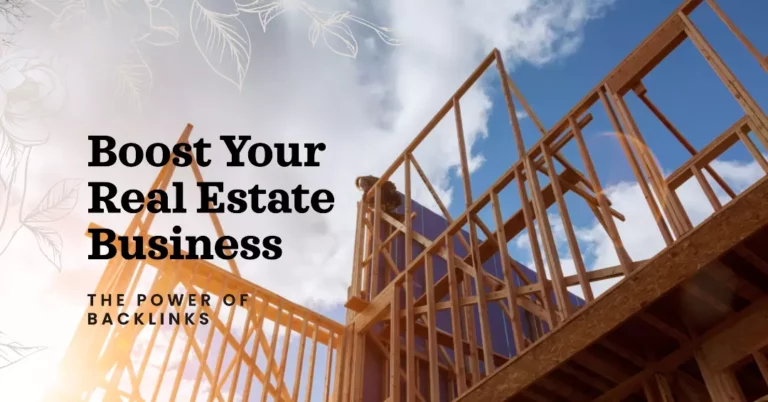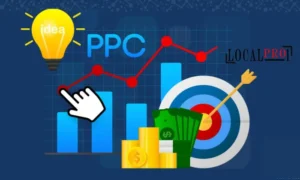Local SEO Services Near Me | Local Pro1 Welcome to...
The Power of Real Estate Backlinks Boosting Your Website’s Authority
The Power of Real Estate Backlinks Boosting Your Website's Authority
In the ever-evolving digital landscape, establishing a strong online presence is vital for businesses across various industries, including the real estate sector. Real estate websites, in particular, benefit significantly from implementing effective Search Engine Optimization (SEO) strategies to improve their visibility in search engine results. Real estate backlinks refer to incoming hyperlinks from one website to another, specifically from external websites to a real estate website. These backlinks act as “votes of confidence” from other websites, indicating that the content and information provided on the real estate site are valuable and trustworthy. Local pro 1 will provide you the best backlinks for real estate and the guidance related to real estate backlinks.

What Are Real Estate Backlinks?
Real estate backlinks are links from other websites that point back to a real estate website or webpage. They play a crucial role in search engine optimization (SEO) and are essential for improving a website’s search engine ranking and visibility. Backlinks are like “votes” or endorsements from other websites, signaling to search engines that the linked site is reputable and valuable.
Understanding Backlinks in the Context of Real Estate
Definition of Backlinks: In general, backlinks, also known as inbound links or incoming links, are hyperlinks on one website that direct users to another website. They are an integral part of SEO strategies because search engines view them as a vote of confidence in the linked content. The more high-quality backlinks a real estate website has from reputable sources, the more authority and credibility it gains in the eyes of search engines like Google.
How Backlinks Work in Real Estate: Real estate websites can benefit from backlinks in several ways. First, backlinks help search engines discover and crawl a website more effectively. When other websites link to a real estate site, search engine crawlers follow those links and index the linked pages, potentially improving the website’s visibility in search results.
Second, backlinks from authoritative and relevant websites can boost a real estate website’s domain authority. Domain authority is a metric that search engines use to assess a site’s credibility and expertise. The higher the domain authority, the more likely the website will rank well in search engine results pages (SERPs).
Types of Real Estate Backlinks
External Backlinks: External backlinks are links that originate from other websites and direct users to the real estate website. These external backlinks are especially valuable when they come from authoritative and relevant sources within the real estate industry or related fields. For example, a backlink from a reputable real estate blog or a local business directory can significantly improve a real estate website’s SEO.
Internal Backlinks: Internal backlinks are links within a real estate website that connect one page to another within the same site. They help create a logical and organized website structure, allowing visitors and search engine crawlers to navigate the site more easily. Internal backlinks also distribute link authority throughout the site, potentially boosting the visibility of important pages that might not receive as many external backlinks.
Why Are Real Estate Backlinks Important?
Real estate backlinks are crucial for several reasons, particularly in the context of search engine optimization (SEO) services and building trust and credibility for real estate websites.
Role of Backlinks in Real Estate SEO
Influence on Search Engine Rankings: Backlinks play a significant role in determining a website’s authority and relevance in the eyes of search engines like Google. When reputable websites link to a real estate site, search engines interpret these backlinks as a vote of confidence in the site’s content and reliability. Websites with a higher number of quality backlinks are often seen as more authoritative and tend to rank higher in search engine results for relevant keywords. This increased visibility can lead to more organic traffic, which is valuable for real estate businesses.
Establishing Website Credibility: Backlinks can be seen as endorsements from other websites. When well-established and trustworthy websites link to a real estate site, it can boost the site’s credibility and reputation. Users are more likely to trust and visit a website that comes recommended by other reputable sources. This credibility not only enhances the site’s reputation but can also lead to more conversions and interactions with potential clients.
Building Trust and Reputation
Building Trust: Backlinks from authoritative real estate-related websites, such as industry publications, reputable real estate blogs, or local real estate associations, can help establish trust with potential clients. When users see that a trusted source is linking to a particular real estate website, they are more likely to trust the information and services offered by that site. Trust is a crucial factor in the competitive real estate industry, where clients often make significant decisions based on the information they find online.
Enhancing Reputation: High-quality backlinks can contribute to a real estate website’s reputation as a reliable and valuable resource in the industry. A website that consistently provides valuable content and resources is more likely to receive backlinks from other reputable sources. This positive reputation can result in increased organic traffic, lead generation, and opportunities for collaboration within the real estate community.
Expanding Reach to Potential Clients: Backlinks from relevant websites can drive referral traffic to your real estate website. When visitors click on a link from another site to yours, it can lead to increased exposure to potential clients who might not have found your website otherwise. This expanded reach can be especially valuable in a competitive real estate market.
Factors Affecting the Cost of Backlinks
Domain Authority of the Linking Site: Domain Authority (DA) is a metric developed by Moz that predicts how well a website will rank on search engine results. Websites with higher DA are considered more authoritative and trustworthy by search engines. Backlinks from high DA sites are highly valuable because they can potentially improve the search engine ranking of the linked website. As a result, backlinks from high DA real estate websites would generally be more expensive than those from lower DA sites.
Relevance of the Linking Site to Real Estate: The relevance of the linking site to the real estate niche is a crucial factor in determining the cost of backlinks. Search engines place a lot of importance on relevance when evaluating the value of a backlink. If the linking site is a real estate-related website, it would be more valuable for a real estate website to get a backlink from it compared to a site from a completely unrelated niche.
Other factors that may also influence the cost of real estate backlinks include
Traffic and Engagement: Sites with higher traffic and user engagement tend to have more valuable backlinks since they can drive more potential customers to the linked website.
Link Placement: The location of the backlink on the linking site can also impact its value. Backlinks placed within the content (contextual links) are often more valuable than those in sidebars or footers. Content writing is one of the most important part in the SEO.
Quantity and Diversity of Backlinks: The number of backlinks a website has and their diversity (i.e., coming from different domains) can affect the perceived authority of the website. Too many backlinks from the same domain may have diminishing returns.
Website Reputation and Trustworthiness: Websites with a strong reputation and positive user reviews are more likely to command higher prices for backlinks.
Geographic Location: In the case of real estate, the geographic location of the linking site may play a role. Backlinks from sites that are relevant to the target market or location can be more valuable.
Best Practices for Real Estate Backlinking
Conducting Backlink Audits
Regularly audit your backlinks: Conduct periodic reviews of your website’s backlink profile to identify potentially harmful or low-quality links. Use tools like Google Search Console, Ahrefs, or Moz to analyze and monitor your backlinks.
Identify toxic links: Look for spammy or irrelevant backlinks that could be hurting your site’s SEO. If you find any toxic links, disavow them through Google Search Console to prevent them from negatively affecting your website.
Check for broken links: Ensure that all your existing backlinks lead to live and relevant pages. Broken links can harm your website’s credibility and SEO ranking.
Identifying and Evaluating Link Opportunities
Seek relevant and authoritative websites: Look for real estate industry-related websites, reputable local directories, and online publications that are relevant to your target audience.
Local SEO opportunities: Prioritize links from local businesses, chambers of commerce, and community organizations to boost your website’s local SEO efforts.
Content-based link building: Focus on creating high-quality and valuable content that naturally attracts backlinks from other websites. Infographics, research studies, and in-depth guides are often link-worthy content types.
Guest blogging: Contribute well-written guest posts to authoritative real estate websites. Ensure that your content provides value to readers and is not overly promotional.
Building relationships: Connect with other real estate professionals, bloggers, and influencers in your industry. Networking can lead to natural link opportunities through collaborations and partnerships.
Building a Diverse and Natural Backlink Profile
Avoid link schemes: Do not engage in practices like buying links, link exchanges, or any other manipulative tactics that violate search engine guidelines. Such practices can lead to penalties and damage your website’s reputation.
Anchor text diversity: Use diverse and natural anchor texts for your backlinks. Avoid over-optimization with exact match keywords and instead, use variations and branded anchor texts.
Earn links organically: Strive to earn backlinks naturally by producing valuable and shareable content, providing exceptional service, and maintaining an active online presence.
Social media engagement: Leverage social media platforms to share your content and engage with your audience. While social media links may not directly impact SEO, they can amplify your content and attract organic backlinks.
Monitor link growth: Gradually build your backlink profile over time to avoid sudden spikes, which may appear unnatural to search engines. Steady and organic growth is preferable.
Conclusion
Throughout this discussion, we have explored the importance of real estate backlinks and their significance in the context of search engine optimization (SEO) for real estate websites. Backlinks play a crucial role in determining a website’s authority and credibility in the eyes of search engines like Google. As real estate websites gain higher rankings in SERPs, they attract more organic traffic. This can lead to more potential clients and opportunities for real estate agents and agencies. Feel free to contact us for any type of queries or guidance.
FAQs
What are real estate backlinks, and why are they important?
Real estate backlinks are links from other websites that direct traffic to your real estate website. They are essential for search engine optimization (SEO) as they contribute to improved search engine rankings, increased organic traffic, and enhanced credibility for your real estate business.
How do backlinks impact my real estate website’s SEO?
Backlinks play a significant role in determining your website’s authority and credibility in search engine algorithms. Websites with more quality backlinks tend to rank higher in search engine results, leading to increased visibility and organic traffic.
What types of websites should I target for real estate backlinks?
Aim to acquire backlinks from reputable and authoritative sources within the real estate industry, such as real estate directories, local business associations, property-related blogs, and professional organizations.
How can I build real estate backlinks effectively?
Building real estate backlinks involves various strategies, including creating valuable and shareable content, guest posting on relevant websites, networking with other real estate professionals, and leveraging social media to promote your content.
Are all backlinks equally valuable for real estate SEO?
No, the quality of backlinks matters more than the quantity. High-authority and relevant backlinks from reputable websites hold more weight in search engine algorithms and provide more significant SEO benefits.
Our Services
Our Latest Posts
PPC White Label Services by Local Pro1 | Expert Solutions
PPC White Label Services by Local Pro1 | Expert Solutions...



